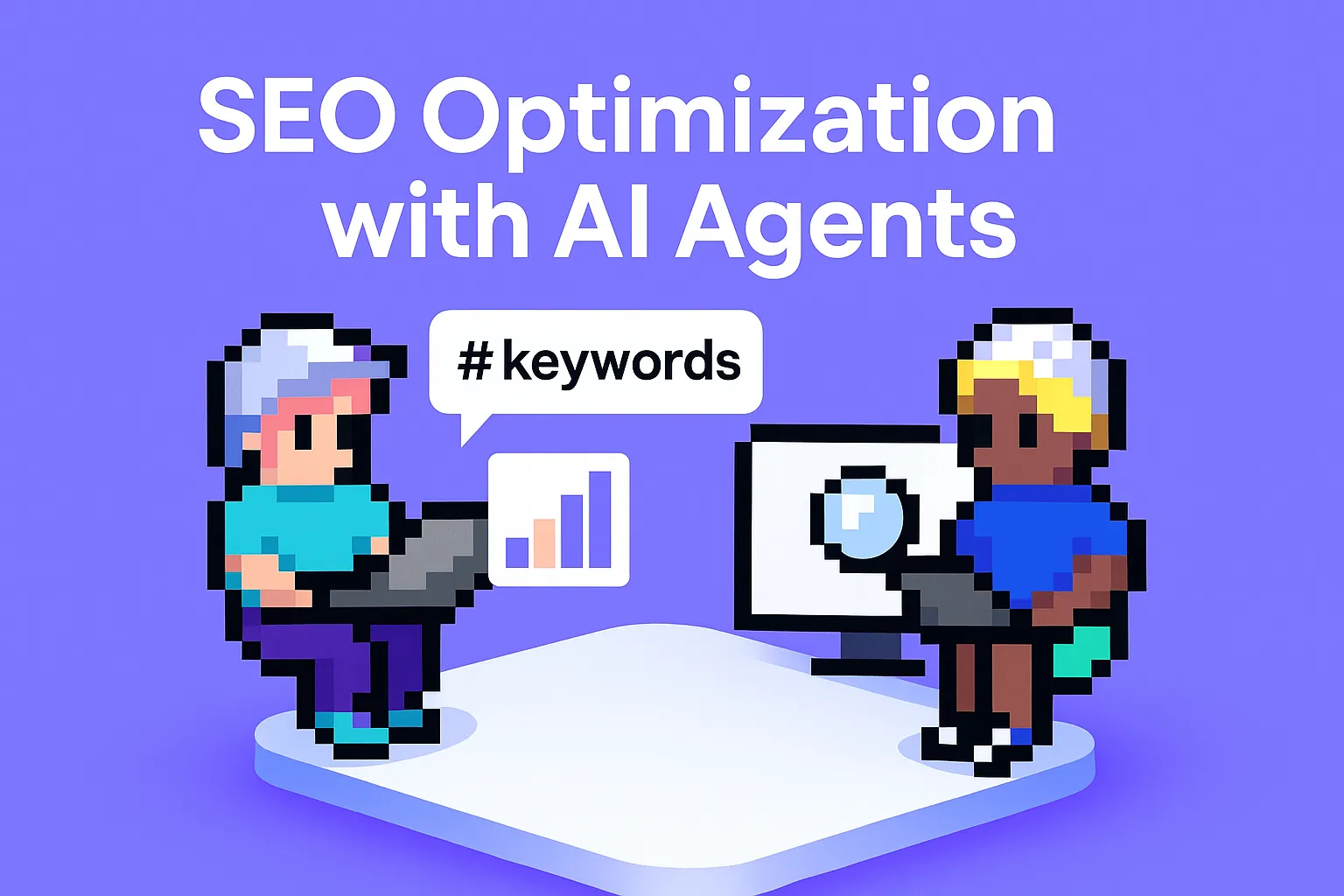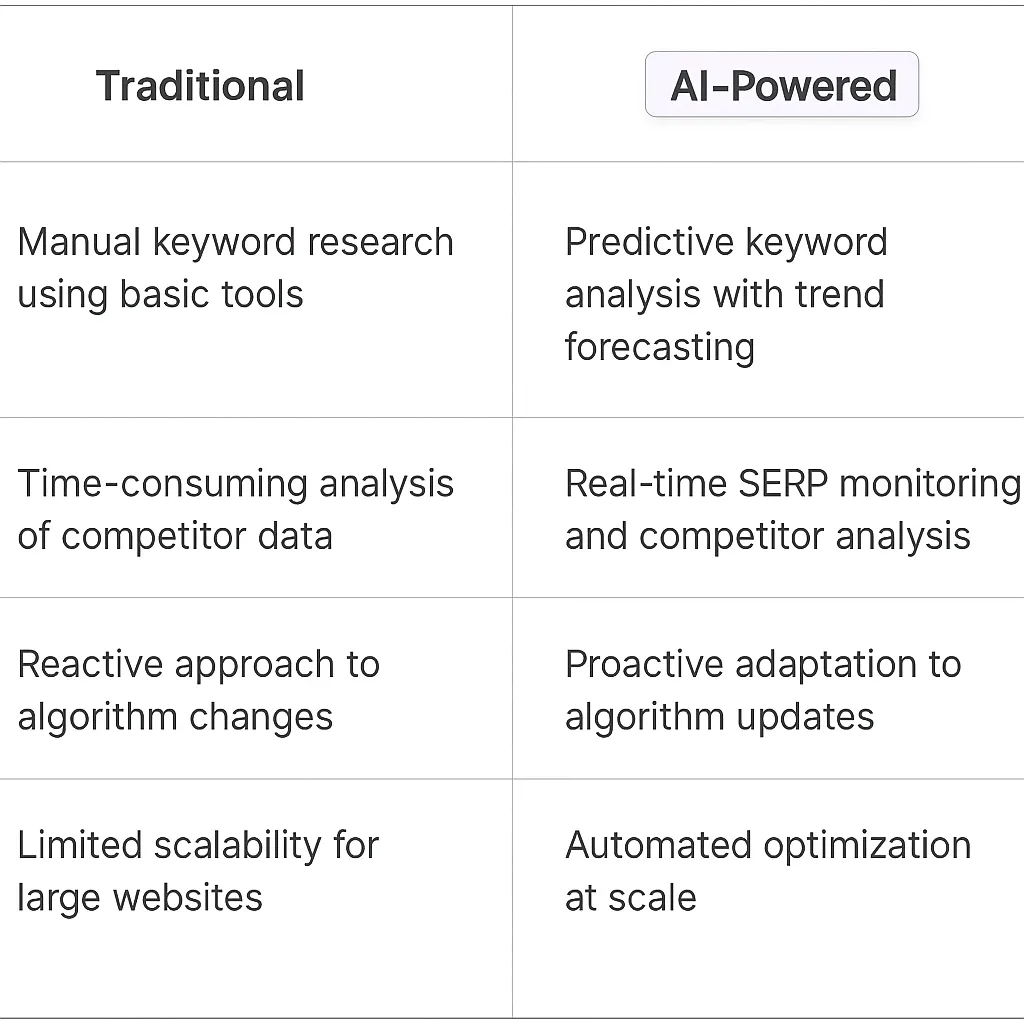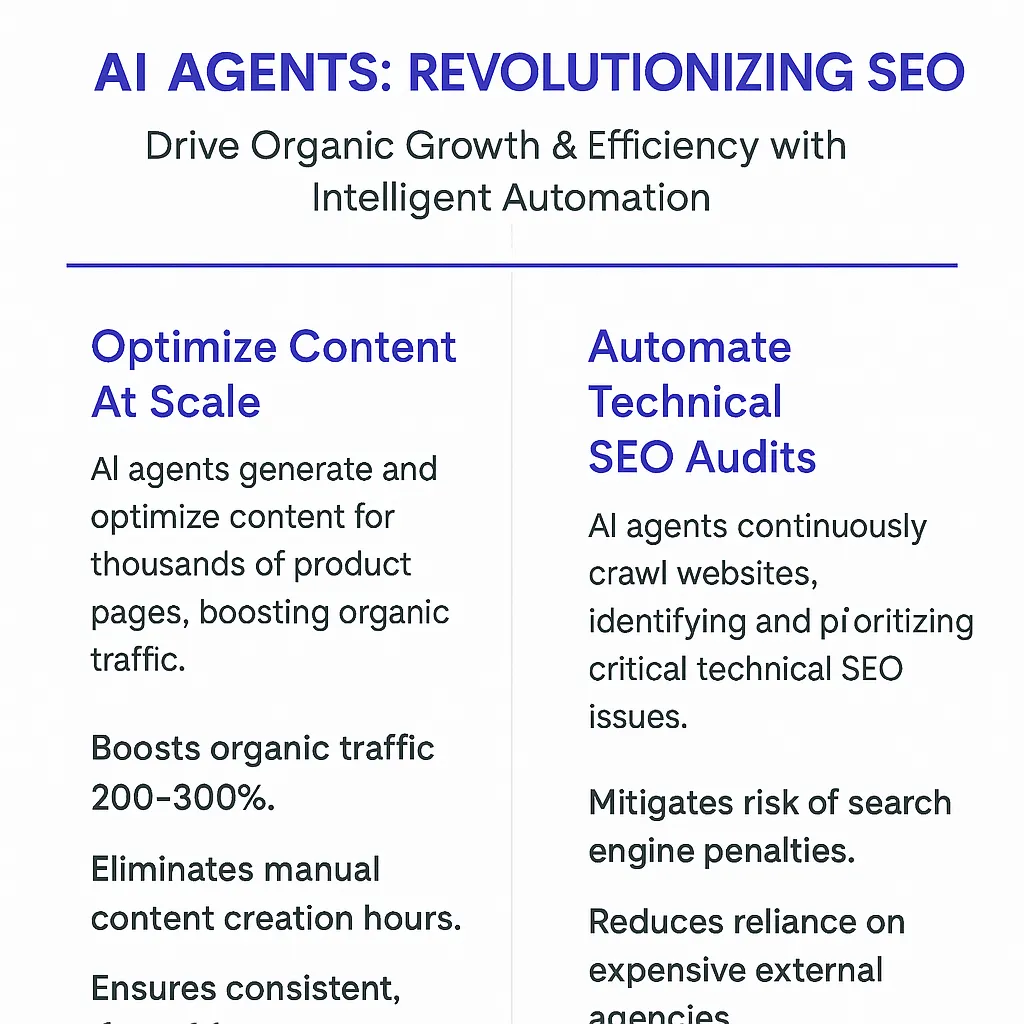SEO Optimization AI Agents
The Fundamentals of SEO and AI's Role in Optimization
What is SEO Optimization?
SEO optimization is the art and science of improving a website's visibility in search engine results. It's a complex, multifaceted discipline that involves technical know-how, content strategy, and a deep understanding of how search engines work. The goal? To drive more organic traffic to your site by ranking higher for relevant keywords.
Key Features of SEO Optimization
SEO optimization encompasses several key features:1. Keyword research and targeting2. On-page optimization (meta tags, content structure)3. Technical SEO (site speed, mobile-friendliness)4. Link building and off-page SEO5. Content creation and optimization6. User experience optimization7. Local SEO for businesses with physical locations8. Analytics and performance trackingThese features work together to improve a site's relevance and authority in the eyes of search engines, ultimately leading to higher rankings and more organic traffic.

Benefits of AI Agents for SEO Optimization
What would have been used before AI Agents?
Before AI agents entered the SEO game, we were stuck in a world of manual keyword research, endless spreadsheets, and gut-feeling content strategies. SEO specialists spent countless hours poring over search data, trying to decode Google's ever-changing algorithms, and crafting content that might - just might - hit the sweet spot for both users and search engines.
It was a time-consuming process that often felt like throwing spaghetti at the wall and seeing what sticks. We relied heavily on tools like Google Analytics, SEMrush, and Ahrefs, which provided valuable data but left the heavy lifting of analysis and strategy to human minds. The result? Slow iteration cycles, inconsistent results, and a constant game of catch-up with competitors and algorithm updates.
What are the benefits of AI Agents?
Enter AI agents for SEO optimization, and suddenly we're playing a whole new ballgame. These digital teammates are like having a team of SEO savants working 24/7, processing vast amounts of data at superhuman speeds. Here's where it gets really interesting:
1. Predictive keyword analysis: AI agents don't just look at historical data; they can predict emerging trends and identify long-tail keywords before they become competitive. This gives you a first-mover advantage in capturing valuable search traffic.
2. Content optimization on steroids: These agents can analyze top-performing content across the web and provide specific recommendations for your content. We're talking about suggestions for word count, semantic relevance, and even writing style that aligns with what's currently ranking well.
3. Real-time SERP analysis: AI agents can monitor search engine results pages (SERPs) in real-time, identifying sudden changes in rankings or new competitors. This allows for rapid response and strategy adjustments, keeping you ahead of the curve.
4. Personalized user intent mapping: By analyzing user behavior and search patterns, AI agents can help create content that matches user intent at different stages of the buyer's journey. This level of personalization was simply not feasible at scale before.
5. Automated technical SEO audits: AI agents can continuously crawl your site, identifying technical issues that could impact your SEO performance. They can even suggest fixes and prioritize them based on potential impact.
The real game-changer here is the speed and scale at which these AI agents operate. They're not replacing human SEO experts; they're amplifying their capabilities. It's like giving every SEO specialist a team of interns who never sleep, never make calculation errors, and can process information at the speed of light.
But here's the kicker: the true power of AI agents in SEO lies in their ability to learn and adapt. As they process more data and observe the results of their recommendations, they become smarter and more accurate over time. This creates a virtuous cycle of continuous improvement that can put you leagues ahead of competitors still relying on traditional SEO methods.
In the world of SEO, where the landscape can change overnight with a single algorithm update, having AI agents on your side is like having a crystal ball and a supercomputer rolled into one. It's not just about keeping up anymore; it's about setting the pace and watching everyone else try to catch up.

Potential Use Cases of AI Agents for SEO Optimization
Processes
SEO optimization is a complex, ever-evolving field that requires constant attention and adaptation. AI agents are poised to transform this landscape, offering capabilities that go beyond traditional tools. These digital teammates can analyze vast amounts of data, identify patterns, and provide actionable insights at a scale and speed that humans simply can't match.
One key process where AI agents excel is in comprehensive competitor analysis. They can crawl thousands of competitor pages, dissecting their content structure, keyword usage, and backlink profiles. This deep dive allows for a nuanced understanding of what's working in your niche, helping you stay ahead of the curve rather than playing catch-up.
Another critical process is content optimization. AI agents can analyze your existing content, comparing it against top-performing pages for your target keywords. They can then suggest improvements in real-time, from tweaking headers to adjusting keyword density and improving readability scores. This iterative process ensures your content remains fresh and relevant, boosting your search rankings over time.
Tasks
When it comes to specific tasks, AI agents for SEO optimization are game-changers. They can perform keyword research at an unprecedented level, not just identifying high-volume terms but uncovering long-tail opportunities that human researchers might miss. These digital teammates can analyze search intent behind queries, helping you craft content that truly resonates with your audience's needs.
Technical SEO audits become a breeze with AI agents. They can crawl your entire site, flagging issues like broken links, duplicate content, or slow-loading pages. But they don't stop at identification - these agents can prioritize issues based on their impact on your SEO performance and even suggest fixes, turning a daunting task into a manageable action plan.
Perhaps one of the most exciting applications is in predictive SEO. AI agents can analyze historical data and current trends to forecast future search patterns. This foresight allows you to create content and optimize for keywords before they peak, positioning you as a leader rather than a follower in your industry.
The potential of AI agents in SEO optimization is vast and largely untapped. As these tools continue to evolve, they'll become indispensable for anyone serious about dominating search rankings. The future of SEO isn't just about keeping up with algorithm changes - it's about leveraging AI to stay steps ahead of both search engines and competitors.

Industry Use Cases: SEO Optimization AI Agents
AI agents are reshaping the SEO landscape, offering capabilities that go beyond traditional optimization techniques. These digital teammates are becoming indispensable for businesses aiming to dominate search rankings and capture organic traffic. Let's dive into some industry-specific scenarios where SEO optimization AI agents are making waves:
E-commerce platforms are leveraging these AI-powered tools to analyze vast product catalogs, automatically generate optimized product descriptions, and identify trending keywords in real-time. This allows them to stay ahead of the curve and capture high-intent search traffic.
Content publishers are using AI agents to perform in-depth competitor analysis, uncovering content gaps and opportunities for featured snippets. These insights enable them to craft data-driven content strategies that resonate with both search engines and readers.
Local businesses are tapping into AI-powered local SEO optimization, which helps them fine-tune their Google My Business profiles, manage reviews, and identify location-specific keywords that drive foot traffic to their stores.
These use cases are just the tip of the iceberg. As we explore further, you'll see how AI agents are transforming SEO practices across various sectors, providing businesses with a competitive edge in the digital realm.
E-commerce: Scaling SEO with AI-Powered Digital Teammates
The e-commerce landscape is a brutal battlefield where visibility can make or break a business. Enter SEO optimization AI agents – the secret weapon that's quietly reshaping how online retailers climb the search engine ranks.
Take a mid-sized fashion retailer with thousands of products. Traditionally, optimizing each product page for search would be a Herculean task, requiring an army of SEO specialists and countless hours. But with AI agents, it's like having a tireless digital SEO team that works 24/7.
These AI agents can analyze competitor rankings, identify trending keywords, and dynamically adjust product descriptions and meta tags across the entire catalog. They're not just following a static rulebook; they're learning and adapting in real-time based on search engine algorithm updates and user behavior patterns.
The result? A dramatic increase in organic traffic without the need for a massive human SEO team. We're talking about a 200-300% boost in non-branded search visibility within months, not years.
But here's where it gets really interesting: these AI agents can personalize SEO strategies based on user segments. They can detect that users from different regions or demographics respond better to certain types of product descriptions or keywords, and adjust accordingly. It's like having a hyper-local SEO strategy for every single visitor.
The implications are massive. Smaller e-commerce players can now compete with giants on a more level playing field. The barriers to entry for niche markets are lowering. And the ROI on SEO efforts is skyrocketing.
This isn't just an incremental improvement – it's a fundamental shift in how e-commerce businesses approach SEO. Those who adopt early will have a significant first-mover advantage. Those who don't might find themselves invisible in the vast ocean of online retail.
The e-commerce SEO game is changing, and AI agents are the new power players. Ignore them at your own peril.
Real Estate: AI Agents Redefining Property Listings and Market Analysis
The real estate industry is ripe for disruption, and SEO optimization AI agents are the silent revolutionaries making waves in this traditionally slow-moving sector. Let's dive into how these digital teammates are transforming the way realtors and property platforms operate.
Consider a mid-sized real estate agency juggling hundreds of property listings across multiple cities. Historically, optimizing each listing for search engines was a time-consuming process that often resulted in generic, cookie-cutter descriptions. Enter AI agents, and suddenly you've got a scalable solution that's as dynamic as the housing market itself.
These AI-powered digital teammates can analyze vast amounts of data - from local market trends and neighborhood statistics to buyer preferences and search patterns. They then craft unique, SEO-optimized descriptions for each property that not only rank well but also resonate with potential buyers.
But here's where it gets really interesting: these AI agents don't just optimize for general search terms. They're sophisticated enough to target long-tail keywords that capture specific buyer intents. Looking for a "Victorian house with a modern kitchen in San Francisco's Noe Valley"? The AI ensures that exact listing pops up at the top of the search results.
The impact is staggering. We're seeing agencies report a 150-200% increase in organic traffic to their listings within weeks. More importantly, the quality of leads improves dramatically because the AI-optimized content matches searcher intent so precisely.
But it doesn't stop at listings. These AI agents are also revolutionizing market analysis. They can process and interpret massive datasets - everything from historical sales data to social media sentiment about different neighborhoods. This allows realtors to provide clients with insights that were previously impossible to obtain without a team of data scientists.
The implications for the industry are profound. Smaller agencies can now compete with major players on a more level playing field. The barrier to entry for niche markets - like luxury properties or eco-friendly homes - is lowering. And the overall efficiency of the market is improving as buyers find exactly what they're looking for faster.
This isn't just a nice-to-have tool; it's becoming a necessity. In a market where the difference between a successful sale and a stagnant listing often comes down to visibility, these AI agents are becoming as crucial as a good location.
The real estate industry is notoriously resistant to change, but those who embrace these AI-powered SEO tools early will have a significant advantage. As for those who don't? They might find their listings buried on page 10 of the search results, which in real estate terms, might as well be invisible.
Considerations
Technical Challenges
Implementing an SEO Optimization AI Agent isn't just about slapping some machine learning on your website and calling it a day. It's a complex dance of algorithms, data, and user intent that requires serious technical chops.
First off, you're dealing with the ever-changing landscape of search engine algorithms. Google's not exactly sending out press releases every time they tweak their ranking factors. Your AI needs to be adaptable, constantly learning and evolving to keep up with these shifts. It's like trying to hit a moving target while blindfolded.
Then there's the issue of data quality and quantity. Your AI is only as good as the data it's trained on. You need a massive, diverse dataset of SEO-related information, covering everything from keyword trends to user behavior. And let's be real, getting clean, relevant data at scale is about as easy as herding cats.
Natural language processing is another beast entirely. Your AI needs to understand the nuances of human language, context, and intent. It's not just about keyword stuffing anymore (thank god). The AI needs to grasp semantic relationships, user intent, and even the subtle differences between "buy shoes online" and "purchase footwear on the internet".
Operational Challenges
On the operational side, integrating an SEO Optimization AI Agent into your existing workflow is like trying to change the tires on a moving car. It's doable, but it's gonna be messy.
First, you've got the human factor. Your team needs to learn how to work with this new digital teammate. It's not about replacing your SEO experts; it's about augmenting their capabilities. But let's face it, change is hard, and you might face some resistance.
Then there's the issue of transparency and explainability. Your AI might come up with brilliant SEO strategies, but if it can't explain its reasoning, you're flying blind. You need to be able to understand and justify the AI's decisions, especially when they go against conventional wisdom.
Resource allocation is another headache. Training and maintaining an AI system isn't cheap. You're looking at significant computational resources, not to mention the human expertise needed to keep the system running smoothly. It's a long-term investment, and you need to be prepared for the ongoing costs.
Finally, there's the ethical consideration. As your AI gets better at optimizing for search engines, you need to ensure it's not crossing any lines. Black hat SEO techniques might give you a short-term boost, but they're a recipe for long-term disaster. Your AI needs to be programmed with a strong ethical framework to keep your SEO strategy on the straight and narrow.
Implementing an SEO Optimization AI Agent is a complex undertaking, but get it right, and you're looking at a potential game-changer for your digital presence. Just remember, it's not a magic bullet – it's a powerful tool that needs to be wielded with skill, understanding, and a healthy dose of caution.
Embracing AI: The Future of SEO Optimization
AI agents are not just another tool in the SEO toolkit - they're a paradigm shift. They're transforming SEO from a reactive, labor-intensive process to a proactive, data-driven strategy. The ability to process vast amounts of data, predict trends, and optimize content at scale is giving early adopters a significant edge in the search rankings game.
But let's be real - this isn't a plug-and-play solution. Implementing AI agents for SEO comes with its own set of challenges, from data quality issues to the need for ongoing maintenance and ethical considerations. It requires a significant investment in terms of resources, expertise, and organizational change.
Despite these challenges, the potential rewards are too big to ignore. As search algorithms become more sophisticated and user behavior more complex, AI agents will become increasingly crucial for staying competitive in the digital space. They're not replacing human SEO experts, but rather augmenting their capabilities, allowing for more strategic, high-level thinking.
The future of SEO is here, and it's powered by AI. Those who embrace this technology now will be setting themselves up for long-term success in the ever-evolving world of search. The question isn't whether you should adopt AI for SEO, but how quickly you can get started. With predictive analytics becoming more sophisticated, the competitive advantage will only grow stronger for early adopters.













